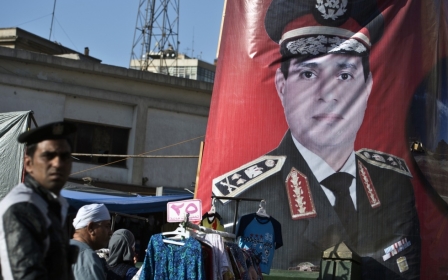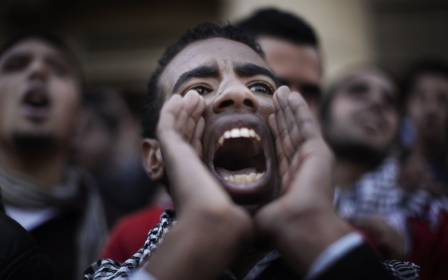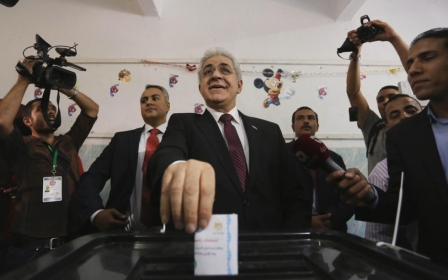Egypt speaks: What are Egyptians thinking on day two of the vote?

Millions of Egyptians have gone to the polls over the last two days to cast their ballots for the second time in two years. There have been street parties and parades but there have also been widespread election boycotts, with the mood remained mixed. Earlier on Tuesday a bomb rocked the wealthy Cairo suburb of Heliopolis while the Prime Minister Ibrahim Mahlab has threatened to fine all those who do not vote a sum of 500 Egyptian pounds (US$70).
Despite Mahlab's threats and the impassioned pleas of Egypt's media to get out the vote, preliminary turnout results have been disappointing, with authorities now officially declaring a third day of voting that will take place on Wednesday. With the polls closing today at 10pm local time (8pm GMT), the divisions were clear to see.
Mohamed Amin, a Cairo resident from Gamelya, Sisi's home neighbourhood
Amin reiterated a sentiment heard often during the election process that Sisi would bring security and stability solve Egypt’s myriad of social problems.
"We wish him after being elected president, to make a peace with the whole world, the US, Israel and with anyone else, not to make a enemy with any one, to be a way from those who make enemies between nations” said Amin. “We want a person who loves the country, this what the poor people care about because they need help, so who can help them?"
New MEE newsletter: Jerusalem Dispatch
Sign up to get the latest insights and analysis on Israel-Palestine, alongside Turkey Unpacked and other MEE newsletters
“[A man] who belongs to them not a strange man, but one from people, who can feel the people. [Sisi] knows the ill, the poor, the needy and so on. We wish from God to dignify us with this man, to succeed and to fear about the country and to help the country as much as he can because the country needs a strong man, man who has a religion, has a faith, and loves the country”, Amin added.
Ahmed Naguy, a former April 6 movement member
As a former youth activist, Naguy says that he is still deeply concerned with ensuring that the ideals of the 25 January revolution live on. However, like some young Egyptians who were keen to see the back of former strongman Hosni Mubarak and later Egypt's first democratically elected president Mohamed Morsi, Nagguy now says he is suffering from “revolutionary depression.” The term has come to be branded about to describe youth disillusioned and despondent with the country and what they view as the return of the security apparatus, Naguy explained.
“When Morsi has been ousted, we were sure that we were on the right [path] to achieve our goals, and we thought that Hamdeen Sabbahi would have been the new president of Egypt and Mohammad El-Baradei his prime minister," he said.
But the widespread crackdown on various kinds of opposition, including April 6, that followed has left Naguy rethinking how best to proceed.
“As for the future, until we will not have a president we, as a movement, didn’t decide yet what our next steps would be. If Sisi wins, we could be the institutional opposition or the revolutionary one, or both of them,” he says. “This is like the bi-polarism, having two opposing coalitions regrouping inside them all the different parties of the political arena. We hope to reach, at some point, the [threshold] to have a [group amongst] the majority in the parliament.”
Fadhel Khaboub, professor at Denison University, Ohio, US
Khaboub is most concerned about the economy and its increasingly dependence on foreign aid and imported goods. The Middle East and economics expert worries that despite Egypt's many economic crises - it is the world's largest importer of wheat and is currently in the midst of a crippling energy crisis - neither candidate has put forth a comprehensive economic plan.
“You can talk social justice, economic justice and so on but [neither candidate has] any specific plan. They just made statements on taxes or on bringing foreign investments and I wouldn’t consider it a serious economic plan,” says Khaboub. “The weakness of the Egyptian economy in particular [and this ignores recent events], is fundamentally the economy suffers from very high external foreign debt."
The problem, according to Khanoub, is that to keep the Egyptian pound strong, the government will have to continuously borrow foreign currency from global banks like the IMF and World Bank, which come with severe policy restrictions.
"The IMF would require economy budget cuts and subsides cut in order to release the IMF loan,” he says, while explaining the difficult political choices at hand.
"Cutting subsidies would raise the price of bread, cooking oil, and gas for the whole country, but would effect Egypt’s poorest citizens most drastically," says Khaboub. "By borrowing foreign currency and raising prices within the country, you are not just causing inflation, but you are pushing the most honorable people in the economy to protest and further unrest.”
Khaled Daoud, spokesperson of Dostour Party or Constitution Party
The Constitution Party was formerly headed by Nobel Peace Prize winner Baradei and is now headed by Hala Shukrallah.
Since the summer, when the military called Egyptians to the streets to support their "war on terrorism", politicians have used the consensus of the Egyptian people as a means to pursue policies on the street.
After the ouster of Mohamed Morsi, his supporters took to the streets to decry the ouster of Egypt’s first democratically elected president. Since then, the concept of democracy has been debated on the within the media and Egyptian society at large.
“Hosni Mubarak and Ahmed Shafik, used to say you, Egypt, are not ready for democracy - but we don’t ask for Western democracy, we ask for basic democracy: social justice and human rights,” Daoud said.
Since the summer, when the military called Egyptians to the streets to support their ‘war on terrorism’, politicians have used the consensus of the Egyptian people as a means to pursue policies on the street. “I don’t want a candidate who says once again, that he’s running just because people are asking him. He has to compete. There is no such a thing as to say, I have no political rival. We want and we need political rivals if we want democracy.”
Mohamed Soudan, Foreign Relations Secretary of the Freedom and Justice Party
"What’s going on in Egypt, just in two words: No election. It’s a fake election," says Mohamed Soudan, Foreign Relations Secretary of the Freedom and Justice Party (FJP), political wing of the Muslim Brotherhood. Under Mohamed Morsi, the FJP were ousted in a coup in July 2013.
He says that the Egyptian people have rejected Sisi's attempts to stage illegitimate elections. "They have to make an extension for one more day, for tomorrow and they give today as a holiday for all the companies, schools and universities," he told MEE, "but no-one wants to be there, because the Egyptian people know that its nothing. Sisi will be the president whether they vote or don’t vote."
"It’s a state of fear, a police state. This is not an atmosphere for an election." he told MEE. "If you compare with the presidential election in 2012, it’s a very, very big difference."
He believes that the low turnout will make Sisi look weak and "embarrass him very, very much in front of the international community".
"I’ll tell you the truth – this election was between Sabbahi and Sisi, but the winner is Morsi."
Member, Students Against the Coup Movement
An Islamist member of the anti-coup Students Against the Coup Movement, who did not want to be named, described the authorities' drive to get the voters out as "blackmail."
"In my village, Badrashin, in the south of Giza province, there was a car this morning carrying speakers, driving around and saying that people who don't vote will be fined with 500 Egytian pounds," he told MEE, "Anyway, we will not go to vote, we won't accept the threat, and we know that they will not fine us. In the rural Egypt, people are loyal to the MB and nobody will go to vote. All this is seen here as a theater play. We all know."
Sarah Korshid, journalist and columnist
Since the revolution, the Egyptian media has disseminated lurid plots of foreign countries interfering in local politics and governance. “People are very much mobilized on this idea of the ‘foreign plot’, as the whole world was conspiring against Egypt. Sisi is not talking about his electoral platform and he is using this foreign plot exuse, pretending that it is a national security issue”, said Sarah Korshid, an Egyptian reporter and columnist.
Often, the result of these stories is a surge in nationalism amongst the people. “The Egyptian flag is everywhere and this sense of hyper nationalism”, she said.
Now, as polling centers lay empty, many have resigned to another monolithic network of businessmen and military administration taking control of the country. “If the MB were a state inside a state, the military is a state above the state”, Korshid said.
Corruption between public officials has been a hot button issue this election. Both Sisi and Sabahi promised to fight corruption in office. But, according to Korshid, “Look at the land property of the armed forces and their relationship with some businessmen” she added, ”I don’t share the general optimism against that Sisi and the military, if he comes into power, will fight corruption.”
Middle East Eye delivers independent and unrivalled coverage and analysis of the Middle East, North Africa and beyond. To learn more about republishing this content and the associated fees, please fill out this form. More about MEE can be found here.




